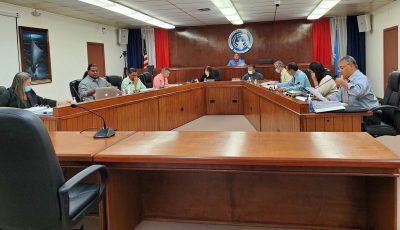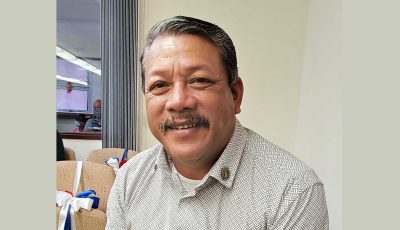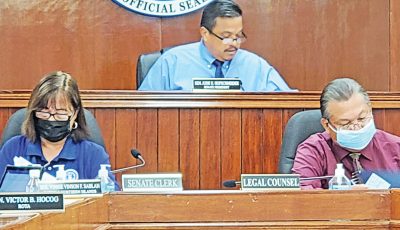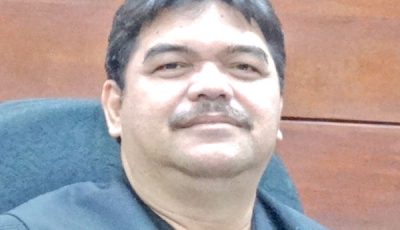Hearing on Article 12 abolition draws opposition
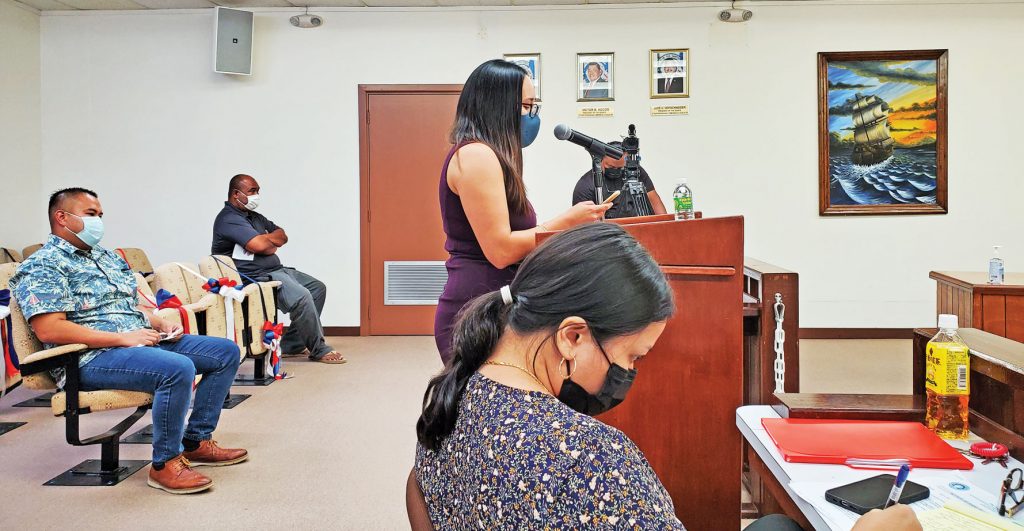
Lawyer Frannie Tenorio Demapan, testifying before the Senate Committee on Resources, Economic Development and Programs at the Senate chamber on Tuesday, expressed opposition to Senate Legislative 22-01 that seeks to amend Article 12 to remove the restriction on the alienation of land in the Commonwealth. (FERDIE DE LA TORRE)
The first public hearing on Senate Legislative 22-01, which Senate President Jude U. Hofschneider (R-Tinian) introduced to amend Article 12 to remove the restriction on the alienation of land in the Commonwealth, drew many opponents yesterday to Capital Hill, including the senator’s older brother, during a public hearing before the Senate Committee on Resources, Economic Development and Programs at the Senate chamber.
Former Commerce Secretary Mark O. Rabauliman, who was the 39th and last to testify, said he appreciates the fact that the proposed initiative has sparked a conversation about Article 12 but, without sound data to provide an objective discussion, the subject “leaves a bitter taste.”
“Therefore I am against the current proposal,” said Rabauliman during the public hearing that started at 5am and adjourned at 8:54pm.
Committee chair Sen. Justo S. Quitugua (R-Saipan) presided over the hearing. Also present were Sens. Hofschneider, Edith E. DeLeon Guerrero (D-Saipan), Vinnie Vinson F. Sablan (Ind-Saipan), Francisco Q. Cruz (R-Tinian), and Karl R. King-Nabors (R-Tinian).
In an interview after the hearing, Hofschneider said the hearing is a good platform and process in addressing the legislative initiative, and that he appreciates the people who expressed their concern with the proposed initiative. “That would assist the committee to drive the legislation, whether or not to amend it,” he said, adding that he will respect the process.
He said it’s the first public hearing on Saipan and that they did a similar hearing on Rota but that the committee might want to do another round on Rota to get satisfactory representation from the people.
Hofschneider said they hope that they can get more hearings or other forms of platforms, but that it’s something that the committee will decide.
Hofschneider said he is glad that some of the younger generation have come out and they’re actually paying attention.
“So hopefully, through this platform the others that are not coming over will have the opportunity to learn from the issues at hand,” he said.
Personally, he said, it’s the right time to bring up the issue and allow the people to air their concerns. “It’s a very sensitive issue and I know it’s bigger than all of us,” he said.
He said the initial turnout on Saipan shows a clearer picture of the issue. “So I encourage everyone to come out, whether or not you oppose it or in support it. Come out at the next public hearing and let your voice be heard,” Hofschneider said.
He said as the sponsor of the bill it’s his responsibility to be at the hearing to hear the sentiments of the people.
Hofschneider earlier stated that the legislative initiative will allow Northern Marianas descent landowners to fully exercise their real property rights, and to reduce the NMD percentage of ownership interest in an NMD corporation.
He clarified that the initiative applies only to private ownership and that public will not be affected by this proposed legislation.
He said an amendment to Article 12 does not take away landownership rights or prevent private citizens from leasing their properties—it merely adds the option for them to sell their land fee simple.
At Tuesday’s hearing, Rabauliman said that finding a middle ground between the CNMI’s ancestors and the new generation is a huge challenge but to just eliminate the protection of the lands without putting in any safeguards or even trying alternative options seems irresponsible or reckless.
“I don’t see a reason not to slow it down and explore options before executing such a drastic measure,” Rabauliman said.
Frannie Tenorio Demapan, who is a lawyer, said she is a person of Northern Marianas descent, a granddaughter of the late Jose Tenorio, a mother of two, and that she stands at the hearing to express her firm opposition to the initiative.
Demapan said she had the unique privilege of seeing both sides of this issue—of being raised in the tradition of the Marianas and also living and being educated in the U.S.
“And I can firmly tell you today that Article 12 is our last saving grace,” she said.
Similar to Hawaii, Demapan said, the CNMI is perfectly positioned in the Pacific for foreign development, for military-related acquisition and for resort expansion. Yet to this day, she said, native Hawaiians continue to fight in order to take back control of their land because they are tired of outside interests influencing their day-to-day activities.
“They grieve the loss of their land, similar to the way we grieve the loss of a loved one,” she said.
To native Hawaiians, she said, no amount of financial gain is worth the eradication of their culture. “Mark my word. If we pass this initiative, we will be outnumbered, will be out-financed,” she pointed out. “History has shown that lifting the restrictions on land alienation inevitably priced out indigenous people to the point where we no longer recognize the very place we call home.”
She said they should not allow Westernized thinking to dominate local ideals. “Our land is sacred. Rich in history and worthy of our protection. Keep native land in native hand,” Demapan said.
Richard Hofschneider said he opposes his youngest brother’s initiative in its entirety. Richard Hofschneider said his brother has the constitutional duty to do that, but that he himself has a constitutional, moral, and cultural to stand at the hearing. Richard Hofschneider said Senate Initiative 22-01 is not good for future generations and an injustice against people.
“This issue is critical for future generations,” he said, suggesting that the committee should open up more public hearings.
Patricia Seman Rasa, a Refaluwasch and Chamorro descent, said she does not usually come out publicly on most issues but Article 12 is something that brings out her maternal instinct to show up and be heard. Rasa has four children, nine grandchildren, and three great-grandchildren.
Rasa said the economy is often used as a tool to abolish Article 12. “At the end of the day, all it takes is for one conglomerate to come in and set the price on land and I promise you that persons of NMDs will no longer have the ability to afford the value set on our land. So, with that said, I ask, whose economy are we talking about?” she asked.
Rasa said Article 12 is a very unique provision in the NMI Constitution and that it is probably one of the strongest provisions ever written to protect NMDs. She said it is also one of the most envied provision by other territories.
“Mr. Chairman and members of this committee, I am pleading on behalf of my children and the unborn to please refrain from passing this [initiative]. And to the author of this bill, what were you thinking?” Rasa asked.
Felix Nogis said he has always been a strong supporter of maintaining Article 12 that, according to him, gives some semblance of empowerment to people when it comes to decisions pertaining to land within the Commonwealth.
Nogis said abolishing Article 12 today will be detrimental to future generations to come. “In fact, we don’t have to look as far as Hawaii. Look at our sister island to the south, whereby the native ends up as tenants in their own land,” he said.
Nogis said the CNMI should be proud and is fortunate to have Article 12 stipulated in the Constitution, which prevent people from exploitation by outside factors with deep pockets.
“It is with such conviction that I stand before your committee, as a private citizen, to solicit this committee’s unwavering commitment and support in leaving Article 12 intact,” he said.
For Keoni Seichi P. Hosono, it is too soon to make amendments to Article 12. “How many experts have we spoken to regarding this matter? How can we better educate the people of the Marianas to understand this issue?” Hosono asked.
She said without landownership and proper protection for the Chamorro and Carolinian people, “we will be paving our own trail of tears to a new tent village.”



